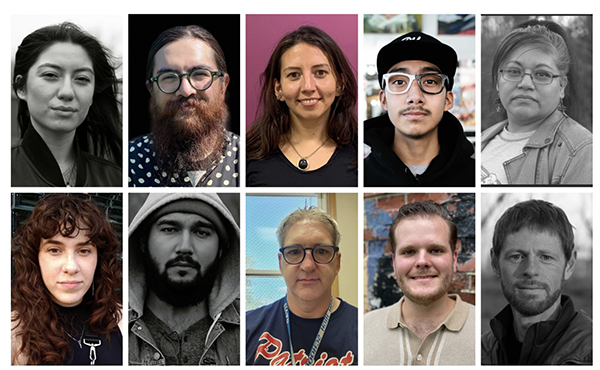Excerpts below are from a story on a month-long hunger strike to stop General Iron (metal scrapper and polluter) from moving into Chicago southside neighborhoods. The original story is published at Southsideweekly.com) and can be read in full on South Side Weekly website.
The story is written by Corli Jay, Ahmad Sayles, Olivia Stovicek, Bridget Vaughn and City Bureau.
Excerpts:
“When Jade Mazon reflects on how she persisted through February’s hunger strike to stop metal scrapper General Iron from moving to her home of the Southeast Side, she keeps naming more sources of support: medics from organizations like Chicago Action Medical and Ujimaa Medics who helped strikers manage their health while they demanded the City deny a permit to the polluting company, community members who provided meals for her daughter so she could rest, organizations that checked in on them.
“I never felt community like I did when I was on the hunger strike, and I feel so blessed and energized by it, even all these months later,” she said. “I still had to take care of my daughter, I was still trying to come up with rent money—life did not stop for those twenty-five days. And without that support, I know I personally would not have lasted that long.”
“Mazon took part in the month-long hunger strike, which ended with the City delaying the permit for the move. But even without the permit denied as organizers demanded, it was a climactic moment in a much longer fight—one that is still ongoing.
“In General Iron’s previous location in predominantly white and wealthy Lincoln Park, it generated multiple environmental violations and years of serious complaints from neighbors about its emissions. When General Iron announced in 2018 that it would partner with another company, Reserve Management Group (RMG), and eventually move operations to RMG’s East Side location, Southeast Siders—and Lincoln Parkers—immediately raised concerns about dumping the shredder in a neighborhood already burdened by industry.
“As opposition coalesced into the Stop General Iron coalition, residents were very clear: Moving the controversial shredder to the majority Latinx and Black Southeast Side—less than a mile from two schools, no less—was environmental racism.
“Promoting industrial development on the Southeast Side is nothing new. With the Calumet River providing an early draw for industry because of the transportation it offered, the area became a hub for steel mills and factories starting in the late 1800s. As the steel mills closed, City policy kept incentivizing industry to concentrate in the region, designating much of the area as an industrial corridor—the largest in Chicago—in 1995 and zoning most of the corridor as a planned manufacturing district, meant to encourage industry, in 2004.
“But the long history of industrial development—and pollution—has also meant a long history of resistance. Environmental justice organizing in the area reaches back to at least 1979, when People for Community Recovery was founded in Altgeld Gardens by Hazel Johnson, whose work to address the high cancer rates in the community and the landfills and pollution contributing to it earned her the moniker “the mother of environmental justice.” In the last ten years, residents have fought with the Southeast Side Coalition to Ban Petcoke, the Southeast Environmental Task Force, and more against harm from petcoke, manganese, and lead.
“The campaign to Stop General Iron drew on knowledge from all those fights. Building on the efforts of many others who participated in protests, community meetings, and teach-ins, the hunger strike brought more people to action—the campaign estimates that more than 300 people participated in one-day solidarity strikes—and catapulted the story of a polluter seeking to move to a community already affected by environmental injustice into national news.
“Together, the organizers created the conditions that led the U.S. Environmental Protection Agency (EPA) Administrator Michael Regan to send Chicago a letter raising concerns in May, and led Mayor Lori Lightfoot to announce shortly thereafter that the company’s permit was put on hold pending an environmental study at the EPA’s request. In the city’s first public engagement meeting to share information about its “health impact assessment” on November 4, officials indicated the full assessment will be released by January.
“With the General Iron permit delayed, although still not denied, the hunger strikers’ story—and the story of the entire Stop General Iron campaign so far—is one of community power changing what is possible. This summer, we talked to hunger strikers and others who contributed to the fight. Interviews have been edited for length and clarity. . .”


